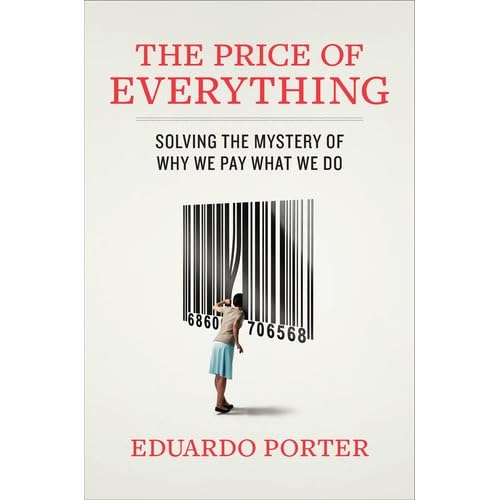ps This guy is soo fancy, I've never seen a trailer for a book before!
He says every choice we make is shaped by the prices of the options laid out before us -- what we assess to be their relative costs -- measured up against their benefits.
Though i realize this such a plastic 1800s way of thinking.... by putting a price tag on everything, but it definitely makes sense at some point but a price tag on everything would sure scare me from doing some things, too expensive...sometimes we pay a price that is not equivalent for what we bought even without realizing, do we really have to know the price of everything, makes everything much harder.....
But the big question is...who determines these prices? Does Culture determine price or does price determine culture? Are these prices even worldwide?
Eduardo says
If one starts with the notion that our choices were honed and shaped over time by evolutionary pressures, like the need to reproduce, I would be tempted to say—though I am not certain—that culture is first a consequence of prices, and then there’s feedback. When people and societies were making choices and decisions with the imperative of surviving and passing on our genes, they were performing cost-benefit calculations. Such calculations evolved into institutions, preferences, rituals, laws, and so forth, eventually growing into a body of culture.
He even put a price tag on Happiness
Yes, partially. Surveys find that richer people tend to be happier than poorer people. That’s because money provides many of the things that improve people’s lot, so it contributes to our happiness a very great deal. But there are other things besides money that make people happy, like finding a mate, seeing a beautiful picture, lazing in the sun.
RIGHT, BUT EVEN LAZING IN THE SUN HAS A PRICE. I COULD OFFER YOU X AMOUNT OF DOLLARS NOT TO LIE OUT IN THE SUN . . .
. . . and if you pay me enough, I won’t lie out in the sun.
SO EVERYTHING DOES HAVE A PRICE!
That’s exactly my point in the book. It’s very simple. We know that when we do something, we are paying for it in some way where the price isn’t necessarily monetary. There are all sorts of currencies. We might, for instance, be paying with our time. Our choices are value judgments, in which this path is more valuable to me than that path based on price, time, or other considerations.
Everything is a cost-benefit analysis.
Read More of Eduardo's interview here


No comments:
Post a Comment